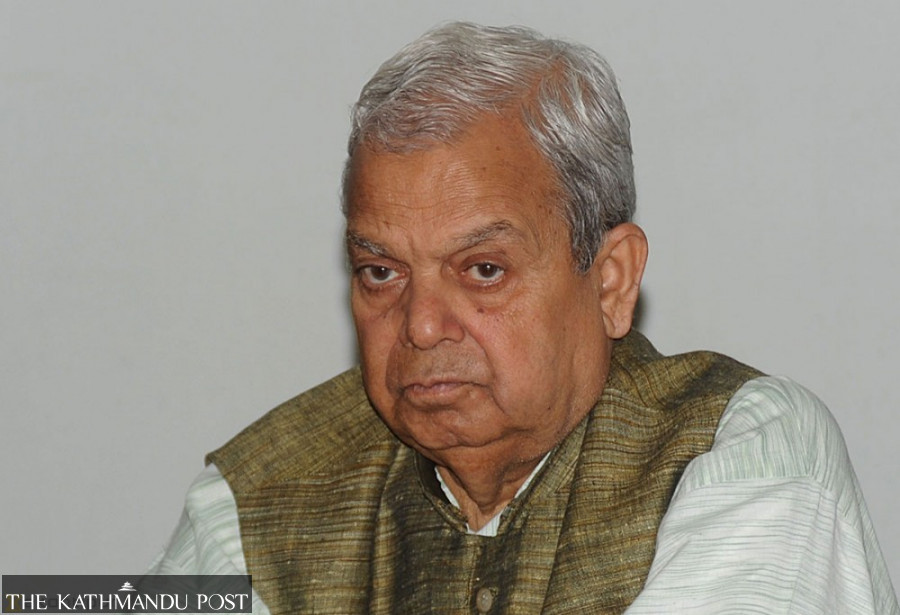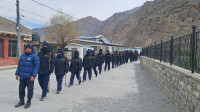Politics
After losing party chair, Mahantha Thakur is in dilemma
The Janata Samajbadi leader is organising gatherings in districts to test the waters as he awaits a crucial court verdict.
Tika R Pradhan
Mahantha Thakur’s dilemma has only grown.
With the Election Commission earlier this week relegating him to the status of an ordinary member of the Janata Samajbadi Party, stripping him of party chair, Thakur has hard choices to make. He can either remain within the party, which is now led by his rival Upendra Yadav as executive chair and Baburam Bhattarai as federal council chair, or form a new party.
Thakur’s Rastriya Janata Party and Yadav-Bhattarai’s Samajbadi Party had merged in April last year to form the Janata Samajbadi Party. The unity, however, failed to conclude because of a host of reasons including some core ideological differences.
The two parties’ unity was dubbed unnatural by observers, and the rift became apparent when the Thakur faction in May decided to stand in support of then prime minister KP Sharma Oli. Both factions staked claims to the party following growing differences.
But on July 26, of the 51 central executive committee members of the party, 34 rallied behind Yadav and Bhattarai, and 16 supported Thakur. Resham Chaudhary, one of the members who has been handed down a life sentence for masterminding the 2015 Tikapur violence, stayed neutral.
The Thakur-led faction is currently conducting a series of gatherings in various districts, in an apparent bid to test the waters.
According to Keshav Jha, a member of the central executive committee close to Thakur, as of Thursday, they had completed gatherings in 19 districts of provinces 1, 2, Lumbini and Sudurpaschim.
He said such gatherings will continue until August 25, when the Supreme Court could issue its verdict on the party row.
In his two writ petitions, Thakur has demanded that the Election Commission’s decision to award the party to Yadav be annulled.
Only the Supreme Court order will make it clear whether the elected representatives from the Thakur faction will retain their positions if Thakur chooses to form a new party. If the court order comes against Thakur, these lawmakers could desert the 79-year-old politician, leaving him high and dry.
“We are excited by the overwhelming support we have received in districts,” said Sarbendra Nath Shukla, a senior leader close to Thakur, who is currently busy organising the gatherings. “Forming a new party is the only way, but we will take a concrete decision only after the court’s verdict. By then, our gatherings will also be over.”
Last year, though the Sanghiya Samajbadi Party and the Rastriya Janata Party had been mulling over unity for quite a while, their merger was hastened by an ordinance that the Oli government introduced in April that year to ease a split and registration of a new party. Both had 17 seats each in the House then.
The Thakur-led group is now left with only 10 lawmakers of the 32 (two suspended) that the Janata Samajbadi Party has in the lower house.
The idea behind their unity was to form a new strong “Madhes-based force” that could counter the Congress and communist parties in the region and gradually exert influence in national politics.
The Rastriya Janata Party itself was born out of a merger of six Madhes-based parties in the run-up to the 2017 general elections. Samajbadi Party was formed after the unity between Yadav’s Sanghiya Samajbadi Forum and Bhattarai’s Naya Shakti parties in May 2019.
After recent developments, Thakur now is left with no option than to wait for the Supreme Court verdict before making any move.
Both Yadav and Thakur factions have their own interpretations of provisions of the Political Parties Act-2017 when it comes to lawmakers’ retaining their positions in case of a party split.
Laxman Lal Karna, a senior leader close to Thakur and an advocate, said people’s representatives of their faction won’t lose their positions even if they form a new party.
And if that happens, Karna said, it would be because of the Election Commission.
“We have not asked the Election Commission to split the party, but the commission has decided that we could form another party as per Clause 44(6) of the Political Parties Act,” said Karna. “So the people’s representatives won’t lose their posts if we form another party.”
Clause 44(6) of the Act states that the Election Commission can allow the faction not recognised as a legitimate party to register as a new party.
However, Ganga Shrestha, a central executive committee member close to Yadav, argued that people’s representatives would not retain their positions as per Clause 32, if the Thakur faction formed a new party.
Clause 32 of the Act states that a people’s representative will be considered to have abandoned the party if s/he tenders resignation, takes membership of another party or forms another party by himself/herself or with others.
Analysts say Thakur could also demand a court order to return the constituent parties to the pre-merger stage, as there is already a precedent. The Supreme Court on March 7 had invalidated the Nepal Communist Party (NCP) reviving the CPN-UML and the Communist Party of Nepal (Maoist Centre).
But until Thakur knows if the lawmakers can retain their positions in case he forms a new party, he is unlikely to take a decision.
“The Thakur group is also waiting for the government to bring an ordinance to amend legal provisions for party split so as to make it easier for the Madhav Nepal faction of the UML to split the party,” said Chandra Kishore, a journalist who follows Madhes politics closely. “If that happens, it could also benefit the Thakur faction.”
As per the existing legal provisions, a faction in any party must have the backing of over 40 percent central members and 40 percent Parliamentary Party members to form a new party. The Thakur faction has neither.
Even if Thakur manages to form a new party after an amendment to the Political Parties Act, things may not be easy for him. He could face a tough time convincing his constituency since his decision to support Oli, who is seen as an anti-Madhesi politician, backfired.
The ongoing gatherings are part of Thakur’s bid to assess the constituency, as Yadav has suddenly emerged as a strong politician.
“Technically, Yadav appears to be stronger, but the question is for how long,” said Chandra Kishore. “After all, everyone has to go to elections sooner or later.”
He believes most of the leaders decided to side with Yadav for power.
It is not clear how many ministerial portfolios the Yadav faction is going to get in the Sher Bahadur Deuba government. Some may desert Yadav if they don’t benefit and rejoin Thakur.
As far as the two factions’ constituencies are concerned, CK Lal, a political commentator, says, no one is going to lose much, as they have their “pocket voters”.
“Even if there is a split, their constituencies will by and large remain intact,” said Lal, who is also a columnist for the Post. “If they go to elections together under an alliance or anything, they might win a few more seats. That’s it.”
Lal does not rule out the possibility of Deuba inviting some members of the Thakur faction to join his Cabinet, as they too had voted for him when the prime minister went for a floor test last month.
“The Thakur faction won’t hesitate to take the opportunity if there is an invitation because it will help them keep the Yadav group in check,” said Lal.
What matters to both Thakur and Yadav during the elections is not the UML, but the Nepali Congress.
“UML is not a significant force in Madhes,” said Lal. “Yadav and Thakur’s politics will largely be shaped by how the Congress makes its moves.”




 10.17°C Kathmandu
10.17°C Kathmandu















